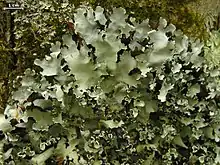Parmotrema stuppuem
Parmotrema stuppuem is a corticolous (bark-dwelling), foliose lichen that belongs to the large family Parmeliaceae. The lichen is commonly known as the powder-edged ruffle lichen and is listed as apparently secure by the Nature Conservancy.[1]
| Parmotrema stuppuem | |
|---|---|
 | |
| in North Carolina, USA | |
| Scientific classification | |
| Domain: | Eukaryota |
| Kingdom: | Fungi |
| Division: | Ascomycota |
| Class: | Lecanoromycetes |
| Order: | Lecanorales |
| Family: | Parmeliaceae |
| Genus: | Parmotrema |
| Species: | P. stuppuem |
| Binomial name | |
| Parmotrema stuppuem | |
| Synonyms[2] | |
Description
Parmotrema stuppuem grows to around 2–20 cm in diameter with broad, dull, smooth gray lobes that are 4–8 mm wide. The underside is black and brown with a central collection of simple rhizines.[3]
Habitat and range
Parmotrema stuppuem has a pantropical and pantemperate distribution, and is found across North America with a majority of samples being collected in and around the Great Lakes region of the United States.[3][4] In Mexico, P. stuppeum is one of the most common foliose lichens found at intermediate to fairly high elevations in the mountains. It also occurs in Europe, southern Africa, southern Asia, and Central America.[5]
Chemistry
Antioxidants have been extracted from Parmotrema stuppuem.[6] Additionally the lichen is a promising host for the development of antibacterial compounds.[7]
See also
References
- "NatureServe Explorer – Parmotrema stuppuem". NatureServe Explorer Parmotrema stuppuem. NatureServe. 2022-08-24. Retrieved 24 Aug 2022.
- "Synonymy. Current Name: Parmotrema stuppeum (Taylor) Hale [as 'stuppea'], Phytologia 28(4): 339 (1974)". Species Fungorum. Retrieved 28 October 2022.
- "CNALH – Parmotrema stuppeum". lichenportal.org. Retrieved 2022-08-24.
- Martellos, P. L. Nimis, S. "Parmotrema stuppeum (Taylor) Hale". italic.units.it. Retrieved 2022-08-24.
{{cite web}}: CS1 maint: multiple names: authors list (link) - Egan, Robert S.; Pérez-Pérez, Rosa Emilia; Nash III, Thomas H. (2016). "Parmotrema in Mexico". In Herrera-Campos, Maria; Pérez-Pérez, Rosa Emilia; Nash III, Thomas H. (eds.). Lichens of Mexico. The Parmeliaceae – Keys, distribution and specimen descriptions. Stuttgart: J. Cramer. pp. 403–405. ISBN 978-3-443-58089-6.
- Jayaprakasha, Guddadarangavvanahally K.; Rao, Lingamallu Jaganmohan (2000-12-01). "Phenolic Constituents from the Lichen Parmotrema stuppeum (Nyl.) Hale and Their Antioxidant Activity". Zeitschrift für Naturforschung C. 55 (11–12): 1018–1022. doi:10.1515/znc-2000-11-1227. ISSN 1865-7125. PMID 11204179. S2CID 1828343.
- George, Ginto; Chandran, R. Pratap; Manju, S.; Kannan, M. (2014-11-02). "Antioxidant and Antibacterial Activity of Parmotrema stuppeum (Taylor) Hale". Journal of Biologically Active Products from Nature. 4 (5–6): 365–370. doi:10.1080/22311866.2014.957092. ISSN 2231-1866. S2CID 96537412.
